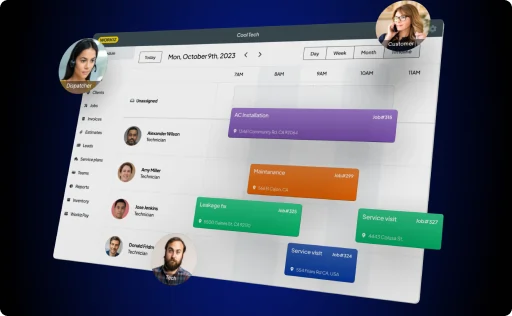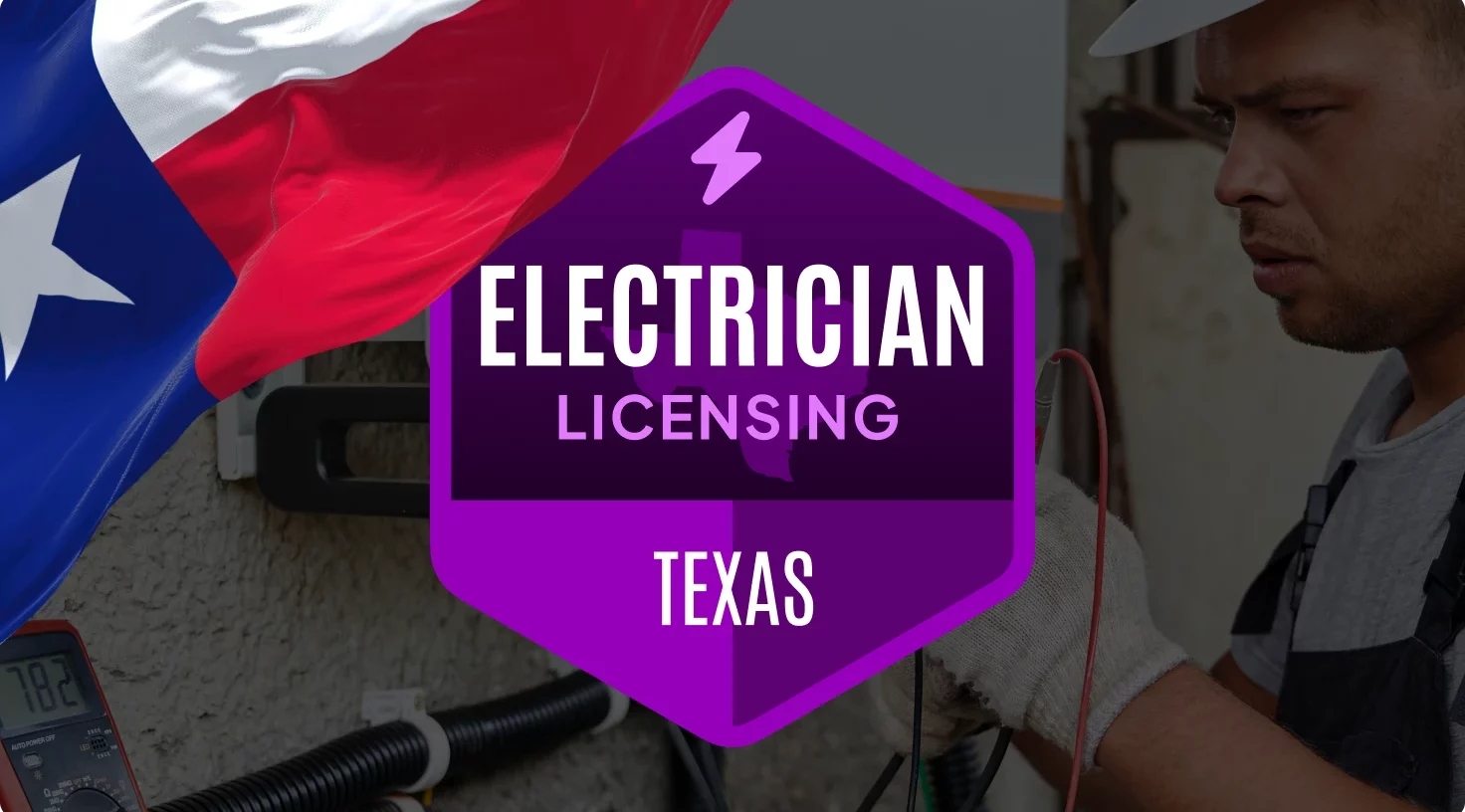All about Texas Electrician License
The Texas Electrician License is a credential bestowed upon individuals who have demonstrated a mastery of the art and science of electrical work. It is not merely a piece of paper; it is a testament to an electrician’s commitment to professionalism, safety, and continuous learning. This license is the golden key that unlocks doors of opportunity, signifying that the holder has met stringent standards set by the Texas Department of Licensing and Regulation (TDLR).
Why is the Texas Electrician License so crucial, you may wonder? Well, it serves as a badge of competence, assuring clients, employers, and the public that the electrician in question possesses the necessary skills, knowledge, and ethical standards to carry out electrical work with precision and safety.
The Bureau of Labor Statistics predicts an annual creation of 80,000 new electrician jobs until 2031, surpassing the 1 million mark for the first time in over 30 years. The surge is propelled by a seismic shift toward electrification, with rising demand for specialized knowledge in installing solar panels, electric vehicle chargers, and more. This surge not only presents exciting opportunities but also brings an attractive paycheck, with the average hourly wage for electricians experiencing a substantial 7.4% year-over-year increase, reaching $37.50 and an annual salary of approximately $78,000. If you are looking for a deeper dive on Electrician salaries, check out this blog on Electrician salaries in 2023.

Source: chartr.co/stories/2023-06-12-3-electricians-are-in-high-demand
Against this backdrop, the Texas Electrician License becomes a symbol not just of regulatory compliance but of distinction and expertise in a field where the demand for skilled professionals is skyrocketing. This article delves into its nuances, highlighting its significance against the backdrop of a booming job market for electricians
Types of Electrician Licenses in Texas
Becoming a licensed electrician in Texas requires obtaining the appropriate license based on your desired area of expertise and experience. The Texas Department of Licensing and Regulation (TDLR) issues various licenses, each with its own set of qualifications and responsibilities. Here’s a breakdown of the most common types:
Entry-level license
This entry-level license allows individuals to work under the supervision of a licensed electrician while gaining hands-on experience and completing required training. Requirements for this type of license include a high school diploma or GED and enrollment in a registered apprenticeship program.
After completing the program and accumulating 8,000 hours of experience, apprentices can then apply for a Journeyman Electrician license.
Residential Wireman License
The Residential Wireman License marks a specific specialization in the electrical realm, focusing on residential settings. This specialized license allows individuals to install, repair, and maintain electrical wiring in single-family and multi-family dwellings.
Requirements include:
- Two years of experience as a licensed Journeyman Electrician.
- Passing the Residential Wireman exam.
- This license is ideal for electricians who specialize in residential wiring projects
Journeyman Electrician License
The Journeyman Electrician License represents a significant milestone in an electrician’s career. Those holding this license have demonstrated a comprehensive understanding of the National Electrical Code (NEC), electrical theory, and practical applications. They can work independently, taking on a variety of electrical tasks with a heightened level of expertise.
Requirements include:
- Four years of documented experience as an apprentice electrician or equivalent experience.
- Passing the Journeyman Electrician exam.
- This license qualifies you to work on most residential, commercial, and industrial electrical systems.
Master Electrician License
The Master Electrician License stands as the pinnacle of electrical mastery. Electricians with this credential have not only amassed years of experience but have also exhibited exceptional knowledge and skills in all facets of the trade. Masters are often responsible for overseeing complex projects, ensuring compliance with codes, and providing mentorship to junior professionals.
Requirements include:
- Two years of experience as a licensed Journeyman Electrician.
- Passing the Master Electrician exam
- Demonstrating 12,000 hours of on-the-job experience.
- This license is necessary for individuals running their own electrical contracting business or taking on supervisory roles in the electrical industry.
Eligibility and prerequisites
In Texas, obtaining a license is not merely a paperwork process; it involves meeting specific eligibility criteria and fulfilling prerequisites that lay the groundwork for a successful and competent electrician. Let’s unravel the key elements that pave the way towards acquiring an electrician license in the Lone Star State.
Basic eligibility criteria:
- Age: 18 years or older
- Education: High school diploma or GED
- Legal Status: U.S. citizen or lawful permanent resident
- Social Security Number
- Clean Criminal Background: Free of felonies or offenses related to dishonesty or fraud
Apprenticeship programs:
- Most licenses require the completion of a registered apprenticeship program.
- These programs provide structured training and supervised on-the-job experience under the guidance of licensed electricians.
- Minimum Hours: The Texas Department of Licensing and Regulation (TDLR) often mandates a minimum number of hours for apprenticeship programs. The length of apprenticeship programs varies depending on the license type.
- Apprentices must document work hours to demonstrate experience.
Relevant experience:
- Some licenses, like the Journeyman Electrician, require documented experience in addition to apprenticeship completion.
- Acceptable experience includes working under the supervision of a licensed electrician or completing approved training programs.
- Experience must be documented and verified by a licensed electrician.
Additional prerequisites:
- Passing the National Electrical Licensing Exam (NECE): This standardized exam assesses knowledge of the National Electrical Code and electrical safety practices.
- Continuing Education: All licenses require completing continuing education courses every two years to maintain active status.
License-specific prerequisites:
- Residential Wireman: Two years of experience as a Journeyman Electrician.
- Master Electrician: Two years of experience as a Journeyman Electrician and passing the Master Electrician exam.
- Maintenance Electrician: Four years of experience maintaining electrical systems.
- Residential Appliance Installer: Completion of a state-approved training program.
Verification and application:
- Applicants must submit all required documentation, including transcripts, proof of experience, and exam results.
- The TDLR reviews applications and verifies eligibility before issuing licenses.
Meet the #1 electrician software >
Steps to obtain a Texas Electrician License
Becoming a licensed electrician in Texas opens doors to exciting career opportunities. While the process may seem daunting, it can be achieved by following specific steps and fulfilling all Texas electrical license requirements.
- Meet eligibility requirements. Ensure you meet the age and education requirements for the specific license type you’re pursuing. That means you must be at least 18 years old. You should also possess a high school diploma or its equivalent to fulfill the basic educational requirement.
- Gain relevant experience. Accumulate the required number of supervised work hours based on the license level you seek (e.g., Apprentice, Residential Wireman, Journeyman, or Master Electrician).
- Complete classroom instruction. Enroll in and complete the mandatory classroom instruction hours associated with your chosen license level.
- Submit application. Prepare and submit the application for your desired license type to the Texas Department of Licensing and Regulation (TDLR). The TDLR will review your application and verify the information. Allow sufficient processing time for your application while the TDLR will notify you of the decision.
- Pay application fees. Pay the applicable fees associated with the license application.
- Pass the required examinations. Successfully pass the necessary examinations, which may include electrical exams, code exams, and practical exams.
- Receive your license. Once you meet all Texas electrical contractor requirements and pass the exams, you’ll be issued your Texas Electrician License.
- Continue education (if applicable). For some license types, fulfill ongoing continuing education requirements to maintain your license.
- Renew your license. Periodically renew your TDLR license to ensure it remains valid.
- Stay informed. Stay informed about updates to state regulations and safety standards to ensure compliance with Texas electrical laws.
Required examinations
In the pursuit of a Texas Electrician License, candidates encounter a series of examinations that evaluate their knowledge, skills, and understanding of the electrical trade
Types of required examinations
Electrical examinations
- Apprentice electricians: Aspiring electricians often start with an electrical journeyman examination, covering fundamental knowledge and practical applications.
- Journeyman and Master Electricians: Higher-level licenses require comprehensive electrical examinations, testing an in-depth understanding of the National Electrical Code (NEC), electrical theory, and practical skills.
Code examinations
National Electrical Code (NEC) Exam: A crucial component for advanced licenses, this exam assesses candidates’ proficiency in understanding and applying the NEC, a vital standard for safe electrical installations.
Practical examinations
Hands-On Assessment: Some licenses may involve practical examinations, where candidates showcase their ability to perform actual electrical work. This could include wiring installations, troubleshooting, and safety procedures.
Tips for exam preparation
Here are some tips to help you take any of these exams and pass them successfully.
- Start early. Begin your preparation well in advance of the scheduled examination to allow ample time for comprehensive review.
- Understand exam content. Familiarize yourself with the specific content areas covered in the exam. For electrical and code exams, focus on the NEC and relevant regulations.
- Utilize study guides. Invest in reputable study guides tailored to the specific exam you are taking. These guides often provide targeted content, practice questions, and insights into the exam format.
- Take practice exams. Practice exams are invaluable for gauging your readiness and identifying areas that require additional study. Many resources offer sample questions similar to those in the actual exams.
- Attend review courses. Consider enrolling in review courses, either online or in-person, to receive structured guidance and clarification on complex topics. Many institutions and organizations offer exam preparation courses.
- Collaborate with peers. Join study groups or forums where you can discuss concepts, share insights, and benefit from the collective knowledge of peers preparing for the same exam.
- Simulate exam conditions. Take practice exams under simulated exam conditions to familiarize yourself with the time.
Continuing education and license renewal
Maintaining current knowledge and skills is crucial for ensuring safety and upholding professional standards in the electrical field. As technology evolves and codes change, continuing education provides electricians with the opportunity to:
- Stay updated on the latest electrical codes and regulations. The National Electrical Code (NEC) undergoes regular revisions to incorporate safety advancements and technological innovations. Continuing education helps electricians stay informed of these changes and ensure their work complies with the latest standards.
- Enhance their knowledge and skills. The electrical field is constantly evolving, with new technologies and techniques emerging regularly. Continuing education courses allow electricians to expand their knowledge base, learn new skills, and stay competitive in the industry.
- Maintain their license. All electrician licenses in Texas require completing specific continuing education hours for renewal. Completing these courses demonstrates their commitment to professional development and ensures they remain competent in their field.
License renewal process
- Renewal deadline: all electrician licenses in Texas expire every two years. Renewal deadlines are staggered based on the license type and expiration date.
- Continuing Education Requirements: The number of continuing education hours required for renewal varies depending on the license type.
- Approved courses: the Texas Department of Licensing and Regulation (TDLR) approves various continuing education courses offered by accredited institutions and organizations.
- Renewal application: licensees must submit a renewal application and pay the required fees before the expiration date.
- Verification of continuing education: the TDLR verifies completion of required continuing education hours before issuing a renewed license.
Renewal fees
- Renewal fees vary depending on the license type.
- Late fees apply for renewal applications submitted after the deadline.
- TDLR website provides detailed information on renewal fees and payment methods.
Consequences of non-renewal
- Failure to renew your license before the expiration date results in an inactive status.
- Performing electrical work with an expired license is illegal and punishable by fines.
- Reinstatement of an expired license requires additional fees and may involve retaking exams.
Benefits of holding a Texas Electrician License
Becoming an Electrician with a license in Texas is not merely a regulatory requirement; it opens doors to a multitude of advantages that significantly impact one’s career trajectory and earning potential.
Increased job opportunities
The demand for skilled electricians in Texas is expected to grow significantly in the coming years due to rapid population growth and ongoing construction projects. As such, having a valid TDLR license opens doors to a wider range of job opportunities in residential, commercial, and industrial settings.
Electricians can work for electrical contractors, construction companies, and government agencies, or even start their own businesses.
- Higher earning potential. Licensed electricians in Texas typically earn well above the average state income. Those who are experienced electricians with specialized skills and certifications can command even higher salaries. Career progression through higher license levels like Master Electrician further increases earning potential.
- Professional recognition and credibility. A license signifies your qualifications and commitment to professionalism. It fosters trust among employers and clients, leading to better job opportunities and contracts. Clients often prefer hiring licensed electricians for their peace of mind and the assurance of quality work.
- Job security and stability. The electrical trade is considered a recession-proof industry, with consistent demand for skilled professionals. Electricians possess valuable and transferable skills that can be applied across various sectors. One way to instill job security is by starting your own electrician business and the best way to manage your entire business all in one place is with a field management software.
Importance of adhering to regulations and safety standards
- Legal compliance. Adhering to state regulations, including licensing requirements, ensures legal compliance. Unlicensed electrical work is not only unethical but can result in severe legal consequences.
- Enhanced safety practices. State regulations and safety standards are designed to prioritize the well-being of both professionals and the public. Adhering to these standards reduces the risk of accidents, ensuring a safer work environment.
- Customer trust and satisfaction. Clients and employers value professionals who prioritize safety and adhere to regulations. This trust translates into increased satisfaction, repeat business, and positive referrals.
- Quality assurance. Licensed electricians are held to rigorous standards. Adhering to these standards ensures the delivery of high-quality work, contributing to the longevity of installations and minimizing the need for repairs.
FAQs and common concerns
Texas Electrician License is a state-issued credential that authorizes individuals to perform electrical work in the state. It ensures that electricians possess the necessary skills, knowledge, and experience to safely install, repair, and maintain electrical systems.
To become an apprentice electrician in Texas, individuals typically need to:
- Be at least 18 years old.
- Possess a high school diploma or equivalent.
- Enroll in an approved electrical apprenticeship program.
- Complete a minimum of 8,000 hours of on-the-job training and 288 hours of classroom instruction.
The different types of electrician licenses in Texas include:
- Apprentice Electrician
- Journeyman Electrician
- Master Electrician
- Residential Wireman
- Maintenance Electrician
- Residential Appliance Installer
The best license for you depends on your career goals and desired area of specialization.
The eligibility requirements for obtaining a Texas Electrician License vary depending on the license type. Generally, they include:
- Age: 18 years or older
- Education: High school diploma or GED
- Legal Status: U.S. citizen or lawful permanent resident
- Social Security Number
- Clean Criminal Background
- Completion of an apprenticeship program (for Journeyman and higher licenses)
- Passing the required exams
The exams required for a Texas Electrician License depend on the specific license type. They typically include:
- National Electrical Code (NEC) Exam
- Electrical Trade Knowledge Exam
- License-specific exams (e.g., Master Electrician exam)
- Practical exam (for certain licenses)
Yes, you may be able to transfer your electrician license from another state to Texas through a process called reciprocity. This process involves submitting your out-of-state license, exam scores, and other documentation to the TDLR for evaluation.
How often do I need to renew my Electrician License, and what’s the renewal process?
All Texas Electrician Licenses expire every two years. You can renew your license online through the TDLR website. To renew, you must:
- Complete the required number of continuing education hours
- Pay the renewal fee
- Submit your renewal application before the expiration date
Licensed electricians in Texas must complete 12 hours of continuing education.
Conclusion
As we mentioned at the start of this guide, having an Electrical License in Texas is not just a regulatory step; it’s a strategic move toward professional advancement. Holding a Texas Electrician License opens doors to increased job opportunities, higher earning potential, and industry recognition.
However, the most important aspect is that you’re eligible to get your license approved. So, are you ready to electrify your career? Take the first step. Research, plan, enroll in apprenticeships, prepare for exams, prioritize safety, and embrace continuous learning. Seize the opportunity to electrify your career in Texas’s thriving electrical landscape. Your journey starts with the decisive move towards obtaining a Texas Electrician License. Go for it!














